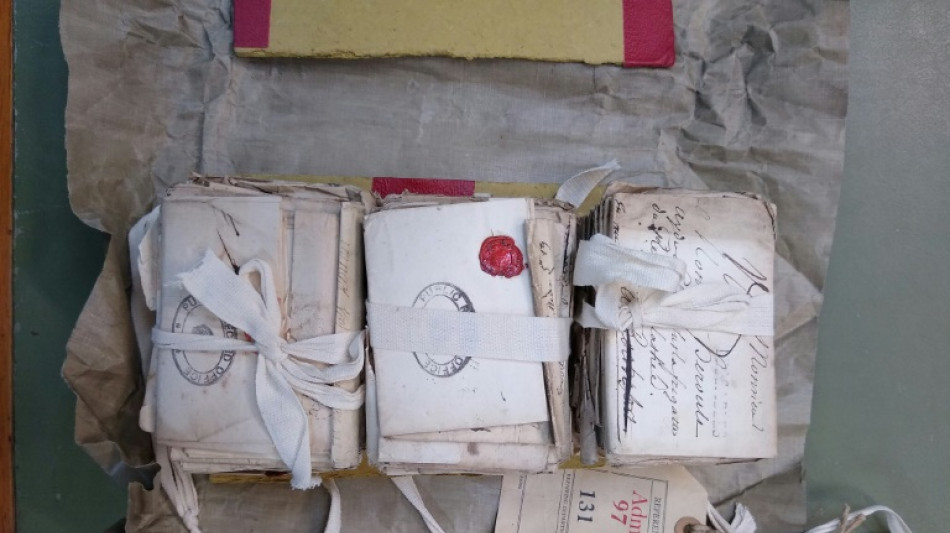
-
 Humanoid robots stride into the future with world's first half-marathon
Humanoid robots stride into the future with world's first half-marathon
-
Migrant's expulsion puts Washington Salvadorans on edge

-
 Plan for expanded Muslim community triggers hope, fear in Texas
Plan for expanded Muslim community triggers hope, fear in Texas
-
Pakistan foreign minister due in Kabul as deportations rise

-
 White House touts Covid-19 'lab leak' theory on revamped site
White House touts Covid-19 'lab leak' theory on revamped site
-
Dodgers star Ohtani skips trip to Texas to await birth of first child

-
 US senator says El Salvador staged 'margarita' photo op
US senator says El Salvador staged 'margarita' photo op
-
Ford 'adjusts' some exports to China due to tariffs

-
 Thomas maintains two-shot lead at RBC Heritage
Thomas maintains two-shot lead at RBC Heritage
-
US to withdraw some 1,000 troops from Syria

-
 Four killed after spring storms wreak havoc in the Alps
Four killed after spring storms wreak havoc in the Alps
-
Spurs' Popovich reportedly home and well after 'medical incident'

-
 Trump goes to war with the Fed
Trump goes to war with the Fed
-
Celtics chase second straight NBA title in playoff field led by Thunder, Cavs

-
 White House site blames China for Covid-19 'lab leak'
White House site blames China for Covid-19 'lab leak'
-
Norris edges Piastri as McLaren top Jeddah practice

-
 Trump warns US could ditch Ukraine talks if no progress
Trump warns US could ditch Ukraine talks if no progress
-
Judge denies Sean 'Diddy' Combs push to delay trial

-
 80 killed in deadliest US attack on Yemen, Huthis say
80 killed in deadliest US attack on Yemen, Huthis say
-
Lebanon says two killed in Israeli strikes in south

-
 Trump says US will soon 'take a pass' if no Ukraine deal
Trump says US will soon 'take a pass' if no Ukraine deal
-
F1 success is 'like cooking' - Ferrari head chef Vasseur

-
 Cycling mulls slowing bikes to make road racing safer
Cycling mulls slowing bikes to make road racing safer
-
Macron invites foreign researchers to 'choose France'

-
 Klopp 'happy' in new job despite Real Madrid rumours: agent
Klopp 'happy' in new job despite Real Madrid rumours: agent
-
Alcaraz into Barcelona semis as defending champion Ruud exits

-
 Vance meets Italy's Meloni before Easter at the Vatican
Vance meets Italy's Meloni before Easter at the Vatican
-
Evenepoel returns with victory in Brabantse Pijl

-
 Maresca confident he will survive Chelsea slump
Maresca confident he will survive Chelsea slump
-
Mob beats to death man from persecuted Pakistan minority

-
 Lebanon says one killed in Israeli strike near Sidon
Lebanon says one killed in Israeli strike near Sidon
-
Arsenal's Havertz could return for Champions League final

-
 US officials split on Ukraine truce prospects
US officials split on Ukraine truce prospects
-
Client brain-dead after Paris cryotherapy session goes wrong

-
 Flick demands answers from La Liga for 'joke' schedule
Flick demands answers from La Liga for 'joke' schedule
-
'Maddest game' sums up Man Utd career for Maguire

-
 Trial opens for students, journalists over Istanbul protests
Trial opens for students, journalists over Istanbul protests
-
Gaza rescuers say Israeli strikes kill 24 after Hamas rejects truce proposal

-
 'Really stuck': Ukraine's EU accession drive stumbles
'Really stuck': Ukraine's EU accession drive stumbles
-
'Not the time to discuss future', says Alonso amid Real Madrid links

-
 74 killed in deadliest US attack on Yemen, Huthis say
74 killed in deadliest US attack on Yemen, Huthis say
-
Southgate's ex-assistant Holland fired by Japan's Yokohama

-
 Vance meets Meloni in Rome before Easter at the Vatican
Vance meets Meloni in Rome before Easter at the Vatican
-
Ryan Gosling to star in new 'Star Wars' film

-
 Hamas calls for pressure to end Israel's aid block on Gaza
Hamas calls for pressure to end Israel's aid block on Gaza
-
Russia says Ukraine energy truce over, US mulls peace talks exit

-
 58 killed in deadliest US strike on Yemen, Huthis say
58 killed in deadliest US strike on Yemen, Huthis say
-
Museums rethink how the Holocaust should be shown

-
 Three dead after deadly spring storm wreaks havoc in the Alps
Three dead after deadly spring storm wreaks havoc in the Alps
-
No need for big changes at Liverpool, says Slot


Confiscated French love letters finally opened after 265 years
Undelivered letters written to French sailors during an 18th century war between Britain and France have finally been opened and studied -- after more than 250 years gathering dust.
The unread letters have provided a rare insight into the lives of sailors and their families in the 1700s, from the wife of a senior naval officer to an elderly mother chastising her son for not writing.
The Royal Navy seized the messages during the Seven Years' War, a global conflict that ended in 1763 that saw Britain and France lead rival alliances.
"I could spend the night writing to you... I am your forever faithful wife," wrote Marie Dubosc to her husband Louis Chamberlain, the first lieutenant of a French warship in 1758.
"Good night, my dear friend. It is midnight. I think it is time for me to rest."
Unknown to Marie, her husband's ship, the Galatee, had been captured by the British, researchers at the University of Cambridge found.
Louis never received the letter and his wife died the following year, almost certainly before he was released by the British.
In another missive dated January 27, 1758, the mother of young sailor Nicolas Quesnel from Normandy takes him to task about his lack of communication.
"I think more about you than you about me... In any case I wish you a happy new year filled with blessings of the Lord," 61-year-old Marguerite wrote in a letter probably dictated to someone else.
"I think I am for the tomb, I have been ill for three weeks. Give my compliments to Varin (a shipmate), it is only his wife who gives me your news," she added.
The Galatee was captured by the British en route from Bordeaux to Quebec in 1758.
- 'Universal human experiences' -
British Admiralty officials at the time deemed the letters of no military significance and the vast majority languished in the archives, unopened, until they attracted the attention of Cambridge history professor Renaud Morieux.
"I only ordered the box out of curiosity," said Morieux, whose findings were published on Tuesday in the journal "Annales. Histoire, Sciences Sociales".
Presented with three piles of very small letters held together by ribbon, Morieux said he "realised I was the first person to read these very personal messages since they were written".
"Their intended recipients didn't get that chance. It was very emotional," he said.
Morieux identified every member of the Galatee's 181-strong crew, with letters addressed to a quarter of them, and also carried out genealogical research into the men and their correspondents.
In 1758 alone a third of France's sailors were captured by the British.
Over the whole period of the Seven Years' War nearly 65,000 were imprisoned by the British.
Some died from disease and malnutrition although others were released.
Letters would have been the only means their families had of trying to contact them, said Morieux.
"These letters are about universal human experiences, they're not unique to France or the 18th century," he added.
"They reveal how we all cope with major life challenges.
"When we are separated from loved ones by events beyond our control like the pandemic or wars, we have to work out how to stay in touch, how to reassure, care for people and keep the passion alive," said the historian.
"Today we have Zoom and WhatsApp. In the 18th century, people only had letters but what they wrote about feels very familiar."
R.Flueckiger--VB


